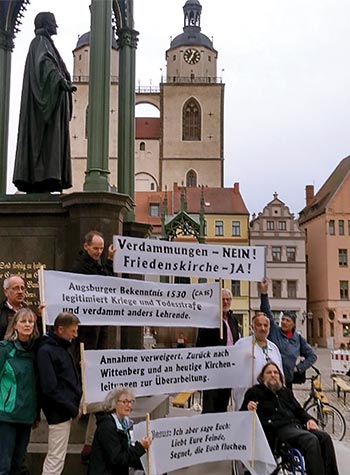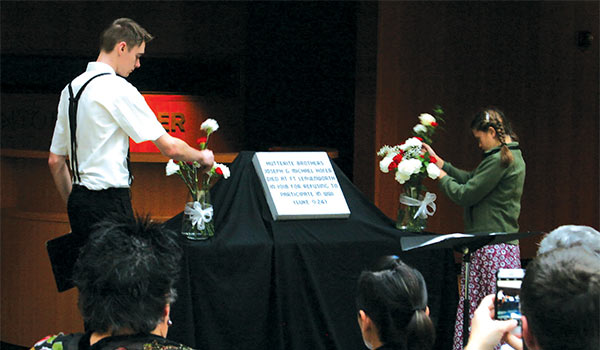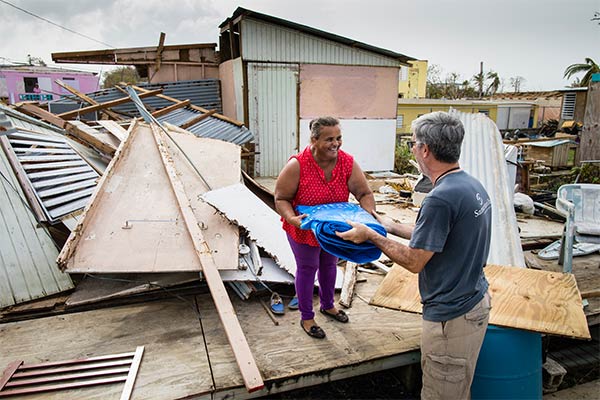Subtotal: $
Checkout-

How to Homestead a Hermitage
-

Awake the Harp
-

The Ministry of Reconciliation
-

The Immortality Machine
-

The Immortality Delusion
-

Simulating Religion
-

Insight: Finding Someone to Worship
-

The Pencil Box
-

Why Children Need White Space
-

Insight: Friedrich Froebel
-

The Technology of Gender
-

Digging Deeper: Issue 15
-

The Gods of Progress
-

Anabaptist Technology
-

Your Neighbor Lives Next Door
-

Insight: Why I Am Not Going to Buy a Computer
-

The Perfect Tool
-

Endangered Habitat
-

The Pen and the Keyboard
-

Meet a True Story
-

A poem for my son about grace
-

Editors’ Picks Issue 15
-

The Soul of Work
-

Go On, Inner Man
-

Viktor Frankl
-

The Joys of Tech Asceticism
-

Readers Respond: Issue 15

Return to Sender in Wittenberg
After a ten-day bicycle pilgrimage from Augsburg to Wittenberg, Article XVI of the Augsburg Confession is finally back on its author’s desk.
Twenty cyclists recently traveled through wind and weather, covering the three hundred and seventy miles between Augsburg and Wittenburg. They arrived in Wittenburg on September 10, just in time for the concluding worship service of the Reformation World Fair. Their mission? To return the Augsburg Confession’s Article XVI to its place of origin. “We’re returning something that should never have left the gates of Wittenberg,” said Thomas Nauerth, the campaign’s initiator, organizer, and navigator.
The Augsburg Confession, a central Reformation confession of faith, was authored by Philipp Melanchthon in 1530. The document still belongs to the official confessions of a range of Protestant churches and, because of this official status, many pastors and church deacons are duty-bound to uphold it. Article XVI states “…that lawful civil ordinances are good works of God, and that it is right for Christians to bear civil office, to sit as judges, to judge matters by the Imperial and other existing laws, to award just punishments, to engage in just wars, to serve as soldiers, to make legal contracts, to hold property, to make oath when required…. They condemn the Anabaptists who forbid these civil offices to Christians” (author’s emphasis).
The cyclists’ proposal? It’s time for Article XVI to go. The International Fellowship of Reconciliation (IFOR), of which Nauerth is a member, has campaigned against injustice and war since 1914. For almost twenty years, Nauerth explained, “IFOR has actively challenged the Lutheran Church to renounce” Article XVI, which has been a dubious means of legitimizing state-sanctioned violence.
Along their route, the peace pilgrims paid tribute to Anabaptist martyrs persecuted by the Lutheran Church, stopping to remember them in prayer and moments of silence. “We stand up for the right of every Christian to say ‘No!’ to war and ‘No!’ to military professions – and we no longer want to be condemned by anyone for this conviction,” was the pacifist cyclists’ unanimous message. A growing number of Christians agree with them. Despite this, Article XVI has never been amended or repudiated.
What’s the next step? The peace pilgrims’ closing statement has a suggestion: “Now it is the Lutheran Church’s duty to formulate a new Article XVI, and to finally acknowledge the martyrs of the sixteenth century…. Christians’ mission and responsibility for the world can be expressed in a better and more peaceful manner.” –Walter L. Buder
Source: Walter L. Buder, “CA 16 – wäre besser in Wittenberg geblieben.” Vorarlberger KirchenBlatt Nr. 38 vom 21. September 2017. Trans. Erna Albertz. Used by permission.
 The peace pilgrims by the statue of Philipp Melanchthon in the main square of Wittenberg Image from Vorarlberger KirchenBlatt 21. September 2017
The peace pilgrims by the statue of Philipp Melanchthon in the main square of Wittenberg Image from Vorarlberger KirchenBlatt 21. September 2017
Already a subscriber? Sign in
Try 3 months of unlimited access. Start your FREE TRIAL today. Cancel anytime.
The Forgotten Martyrs of World War I
In a historic week for war dissenters of all stripes, the pacifists of World War I were recognized at the Remembering Muted Voices Symposium, which took place in October at the National World War I Museum in Kansas City. Andrew Bolton, the conference organizer, was inspired by the story of Hutterite conscientious objectors Joseph and Michael Hofer, who died as a result of mistreatment in Alcatraz Federal Penitentiary and Fort Leavenworth Disciplinary Barracks, where they were imprisoned for their pacifist convictions. (See Duane Stoltzfus’s “The Martyrs of Alcatraz,” Plough no. 1.)
The event sponsors were diverse, including the American Friends Service Committee, the War Resisters League, the American Civil Liberties Union, and the Mennonite Central Committee. At the conference’s conclusion, a stone in remembrance of Joseph and Michael Hofer was unveiled. It will be placed in the Walk of Honor at the foot of the Liberty Memorial along with hundreds of stones dedicated to the veterans of World War I.

At the National World War I Museum in Kansas City, Missouri, young people representing Hutterite, left, and Bruderhof communities lay flowers in remembrance of men who refused to fight in World War I. Photograph reproduced by permission from Tim Huber
But the symposium was about more than remembering. As Ian Kleinsasser, one of the conference speakers, said, “Our purpose today is not to memorialize those who have endured great suffering on account of their faith, but rather to raise stones of remembrance so the principles of nonviolence and peace can be passed on to future generations.”
Already a subscriber? Sign in
Try 3 months of unlimited access. Start your FREE TRIAL today. Cancel anytime.
Puerto Rico Se Levanta
Since Hurricane Maria devastated Puerto Rico’s infrastructure in September, Samaritan’s Purse, a Christian relief organization, has been providing food, water, medical care, and shelter. Andreas King, a member of the Bruderhof community, volunteered with the organization for five weeks. He reports:
Ten weeks after the storm, some people still lack basic necessities like clean drinking water and tarps to cover their roofs. Despite the need, I heard only one complaint: we had brought a water purification unit to an eighty-nine-year-old blind man. “What the hell do I want with water?” he wanted to know. “Give me something real to drink!” The enthusiasm to rebuild is remarkable, and the slogan Puerto Rico Se Levanta – Puerto Rico Shall Rise – is everywhere, on T-shirts, flags, and cars.

Samaritan’s Purse worker distributing emergency shelter kits to people in Puerto Rico Image courtesy of Samaritan’s Purse
As part of their long-term plan for assistance in Puerto Rico, Samaritan’s Purse continues to supply generators, food, water purification units, hygiene kits, blankets, and heavy-duty plastic for shelters for families in need.
To learn more and support their work, visit samaritanspurse.org.
Already a subscriber? Sign in
Try 3 months of unlimited access. Start your FREE TRIAL today. Cancel anytime.




































